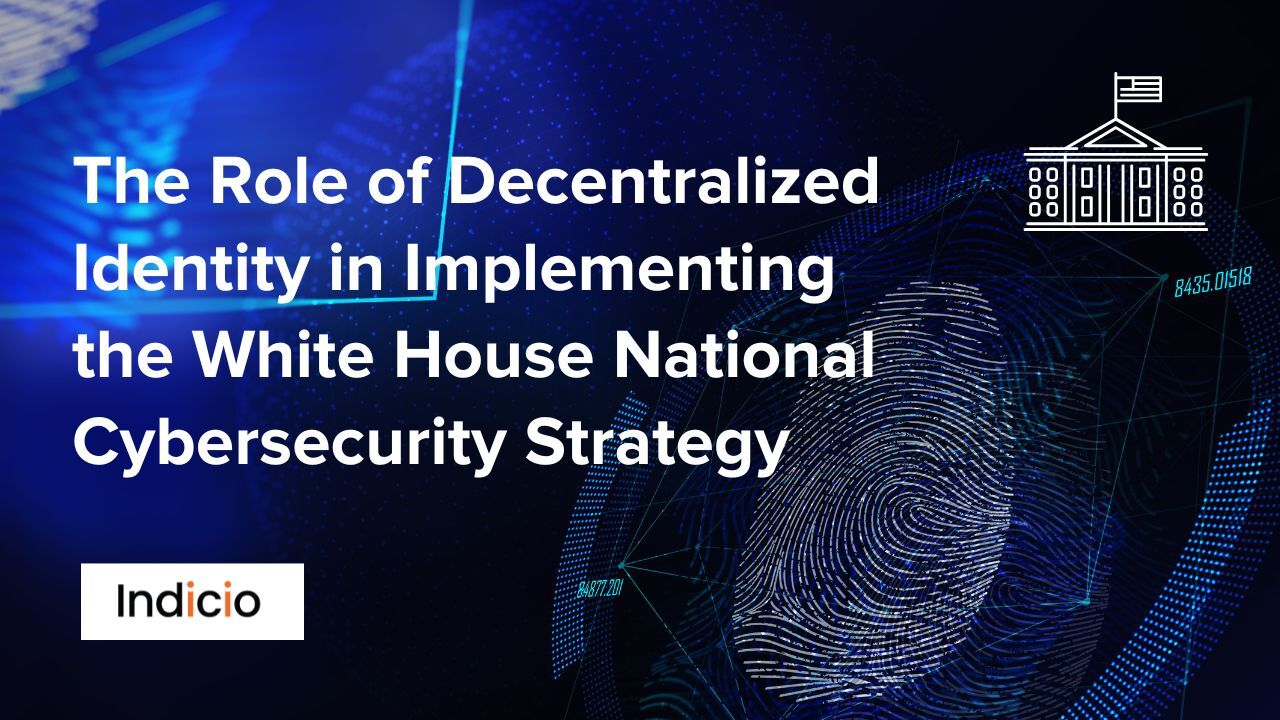The Role of Decentralized Identity in Implementing the White House National Cybersecurity Strategy

On March 1, 2023, the Biden administration released its National Cybersecurity Strategy. The document has a clear and compelling theme: “We must ensure the Internet remains open, free, global, interoperable, reliable, and secure — anchored in universal values that respect human rights and fundamental freedoms.”
These goals are achievable and the route to making this strategy a success lies through open source decentralized identity technology. Simply put, the only way to meet the digital needs of the 21st century, whether in the provision of ecommerce, citizenship, or digital inclusion is to move past the legacy of the 20th: an internet that lacks a reliable way to verify people, data, things.
We’ve been working around this problem for decades and the workarounds don’t work. They’ve saddled us with fraud and stripped us of privacy. They’ve failed to provide the quality that every democratic society needs to thrive: trust. The ability to trust who you are while interacting online. The ability to trust data. The ability to hold one’s own personal data, keep it private, and only share it with consent.
You could say that a problem like this requires a moonshot to solve: that it needs to bring together our best engineers and experts to tackle a problem of global scale. It doesn’t. These problems have been a central concern among open-source technology communities like those at the Hyperledger Foundation for many years. And they—we—have found solutions.
Decentralized identity has provided a way to provide a verification layer for digital interaction; we have ways to prove who we are and know who we are interacting with; we have ways for people to hold their data and share it in a way that preserves their privacy.
It’s difficult to overstate the importance of the next point: These aren’t paper solutions or futureware; industries are leading the adoption of this technology. The prospect of secure, seamless travel — which would take a passenger from online check in to boarding, through border control, and all the way to unlocking their hotel room—is driving the creation of a verifiable digital travel credential.
At Indicio, we have worked with dozens of companies and organizations to design and build solutions for everything from employee identification to auditing devices monitoring emissions to tracking supply chains. We’ve used Hyperledger Foundation technologies to develop verifiable credentials that manage financial transactions, from passwordless proof of account ownership to reusable KYC.
The future is happening now. And because so much of this work has been built on open source codebases (meaning many developers, companies, and even governments passionate about the technology have contributed code), the future is available to everyone.
Strategic Objective 4.5: Support Development of a Digital Identity Ecosystem
In Strategic Objective 4.5 of the National Cybersecurity Strategy, the White House reminds us of the human cost of inaction and inertia: data breaches impacted nearly 300 million people in 2021. Many of these breaches were due to the lack of secure digital identity.
To counter this the Federal Government wants to “encourage and enable investments in strong, verifiable digital identity solutions that promote security, accessibility and interoperability, financial and social inclusion, consumer privacy, and economic growth.”
As the CEO of one of the leading companies developing verifiable digital identity solutions (what we at Indicio call “Trusted Digital Ecosystems”) and as a board member of the Hyperledger Foundation, an organization that supports open source technologies based on digital ledger technology, this is a strategic goal to applaud.
One of the remarkable things we have seen with open source verifiable digital identity is that it has been embraced by businesses and governments alike: everyone who sees the technology in action immediately sees how it is the building block for digital transformation: a way to upgrade web2 and tangible infrastructure for creating web3. With verifiable credentials, anything can be given an identity and that identity and the data associated with it can be verified seamlessly. Decentralized Ecosystem Governance — a machine-readable way of managing roles, rules, and trust within a verifiable identity ecosystem — solves the problem of governance, elegantly.
The ability to implement seamless verification transforms every aspect of digital interaction. If you can trust the data, you can devise processes, products, and services that are frictionless and trustworthy, whether it be proving you own a bank account or want to share your health records or cross a border. Again, this is already happening.
We reincorporated Indicio to become a public benefit corporation because we believed that advancing decentralized identity was a public good that would bring material benefit to everyone. We have encouraged our engineers to embrace work in the open-source communities to help develop new capacities and common standards—and we have encouraged our customers to get involved in these communities too. As the White House and the Federal Government move forward, we hope they will recognize the enormous progress that has been made, that the moonshot worked, and now we’re ready for the stars.
_____
To get involved in the Hyperledger Foundation’s decentralized identity community, join us on Discord in our Hyperledger Aries and/or Hyperledger Indy channels. All are welcome!
